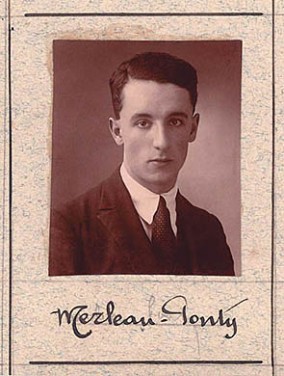Can You Hear Me?
The Importance of Voice in Identity and the Recognition of the Other.
In this article I will argue for the importance of Voice in our understanding of human identity and argue that the recognition of the Other is not dependent on vision alone but is supported by at least two of the other senses; touch and hearing.
A child’s vision takes time to develop, a new born can only distinguish forms and object a couple of inches away, yet their hearing and sense of touch are often more, or even fully, developed at birth. Indeed a baby, before being able to recognize the Other visually and before they are aware of their bodily limits and image, Lacan’s ‘mirror stage’, they, through touch, are able to recognize the difference between touching and being touched, in other words, the physical limitation of their body. Or as Merleau-Ponty (1962) argues on the importance of the body; ‘the body catches itself from the outside engaged in a cognitive process […] and initiates ‘a kind of reflection’ which is sufficient to distinguish it from objects.’(107).
Paul Auster’s – Winter Journal

Published thirty years after the publication of his debut novel The Invention of Solitude Paul Auster’s latest novel Winter Journal can (and has been) read as a continuation or rather a sequel of this first book. There are however striking differences between the two novel, something to be expected with a thirty year gap in between. More about this in a later post. For now I will first however address this novel on its own (and plentiful) merits.
Auster’s Winter Journal is, in its essence, a highly personal working through of questions that arise from getting older, of discovering that life’s good, the bad, and the traumatic experiences are ultimately finite and death comes for all at one point or another.
This reworking of the biographical novel opens several days before Auster’s 64th birthday as he sits himself in front of his desk and begins the mull over his life and the text itself is a detailed account of it. This in itself is very nicely done and is certainly interesting for anyone trying to discover some of the secrets of this grandmaster of the postmodern novel. Indeed I suspect many prospective writers and students of literature will find this novel quite alluring as it gives a first-person account of the life of a writer. Yet any trying to attain an insight into Auster’s means of writing, of discovering how he writes what he writes will sadly be left disappointed.
Winter Journal, however, does something far more interesting than giving a peak into the inner workings of a literary mind. With this novel Auster is trying to over come that which many of his protagonists of his novels (The New York Trilogy, Oracle Night, The Country of Last Things etc etc) experience or suffer through, a loss of self and identity and to me Auster is attempting to cope with or even overcome this loss in much the same way that his protagonists do. By writing. In some way this reading is highly reminiscent of Auster’s novel Man in Dark in which fiction and reality are intertwined (as with most Auster novels) and in which the “real” protagonist, a storyteller meets his fictional creation. In a sense this is similar to what happens in Winter Journal, Auster’s fiction has become real. Auster himself, in this autobiography is experiencing that which he has written about on so many occasions and is working through it in the same way his fictional characters have, by writing.
By the act of writing Winter Journal Auster has turned the page and ink receiving his thoughts into a symbolic other (in a Lacan and Butler sense) upon which to construct and reconstruct his own identity, something to reassess his sense of self upon. Winter Journal should thus be read as a diary of a man, late in life, trying to figure out who he was and who he is. Through this text Auster is taking stock of his own life, trying to find himself, or at the very least trying to make sense of who he is now that old age is distancing himself from his body, a body that is failing him more often, a body which through all its scars and marks should tell him who he is.
In conclusion then, this new novel by Paul Auster is something completely different from what one would expect to read in an autobiography. It is not a tale of a man relating his life story, it is the wanderings of a mind trying to come to terms with himself. In this it is a powerful and unique read. It is the search for the self that comes with old age, a search for understanding, and in doing this it is a novel which does what many texts try to do yet only the good ones achieve, one of the main purposes of good literary work; it teaches how to live, how to experience and how to cope with growing older, when our bodies can no longer do all the things we once could.
